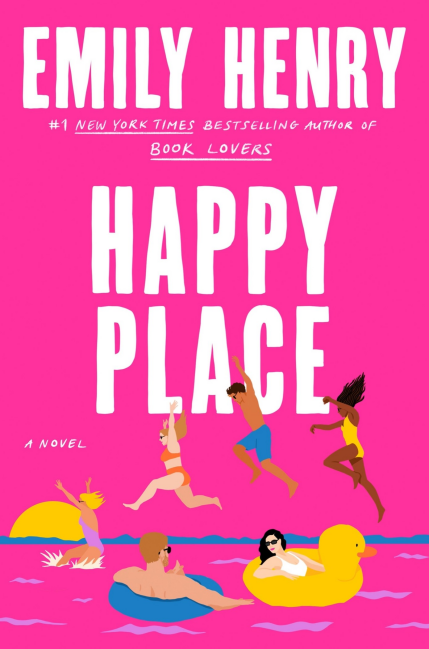Happy Place, by Emily Henry

Happy Place by Emily Henry
My rating: 5 of 5 stars
There seem to be two Emily Henrys: The first one writes straightforward, somewhat simple rom-com novels like “Beach Read” or “Book Lovers” which aren’t outright bad but decidedly average in many ways. I read both, wrote a review and awarded three stars each and promptly forgot about them.
The second Emily Henry writes much more nuanced and complex. With “People We Meet on Vacation” she created a novel about a decade of vacations that’s, ultimately, about the concept of home. Now this Emily Henry, the one that I vastly prefer, wrote a novel about long-time friends and keeping up traditions that’s in fact about change and personal growth.
»Everything is changing. It has to. You can’t stop time.«
Harriet and Wyn were engaged, broke up months ago but never told anyone and now have to spend a week on holidays with their friends. Since this trip is the end of an era, everyone pretends nothing has ever changed and relies on their friends to play along. Which works astoundingly well, even though there are some tensions – until it all breaks apart.
»A dangerous quiet, like one tiny peep might make the cracks spread, the house collapse.«
I really enjoyed all the characters in this one: Especially Harriet and Wyn who are so obviously still in love with each other and yet so hurt they can hardly be in the same room without hurting each other as if by little pinpricks.
For a long time, it seems like they can’t be with each other, but also can’t be without each other. This is also reflected in the short interlude chapters, which mostly revolve around Harriet’s “Happy Places”. While I usually find such interludes distracting, here they felt perfectly fitting into the narrative of the “real life” that contrasts them.
»My best friends taught me a new kind of quiet, the peaceful stillness of knowing one another so well you don’t need to fill the space. And a new kind of loud: noise as a celebration, as the overflow of joy at being alive, here, now.«
The way Henry shows how both Harriet and Wyn personally developed, changed, and grew while apart from each other was also very well done and allowed for both of them to carefully and cautiously come closer to each other and reacquaint with each other individually.
»“Is there one that looks like us?” [Wyn] asks.
They all do, I think. You are in all of my happiest places.
You are where my mind goes when it needs to be soothed.«
Thankfully, the other characters were similarly interesting and well-developed: Cleo who always seems to tread lightly and carefully – until she decidedly rejects strong suggestions and, thus, sets in motion a series of events both fracturing relationships while simultaneously revitalising them with greater resilience.
Sabrina, who seems to be orchestrating, steering and, at times, manipulating people into doing what she deems best, is much less of a schemer at a closer look and much more of a good friend who is extremely afraid of losing her friends.
»“I’m with Sabrina on this one,” Parth says.
She holds the bottle up as she tries to cup a hand around her ear. “What’s that? Is that just global warming I’m feeling, or has hell frozen over and Parth is actually agreeing with me on something?”
“I’m agreeing with you,” Parth says, “because this time, you’re right. It was bound to happen eventually.”«
Every single person here is – in their own way – a mess. Complex, difficult, at times annoying, kind and brilliant, insecure and yet confident. In “Happy Place” Henry does more than just create a funny romance; she explores the complexities of love, friendship, and identity. She writes with humour, heart, and insight, creating characters that are relatable, flawed, and lovable.
»“There doesn’t need to be a winner and a loser. You just have to care how the other person feels. You have to care more about them than you do about being right.”«
The setting of the Maine cottage is another highlight of the book. Henry does a great job of describing the beauty and tranquillity of the coastal scenery, as well as the cosy and nostalgic atmosphere of the cottage. You can almost smell the salty air, taste the cheese and wine, and feel the warmth of the sun. The cottage is more than just a place, it’s a symbol of their friendship and their happy place.
Finally, add the excellent pacing and good writing and you get a book that is hard to put down and easy to enjoy.
And, of course, I loved how in the end “Happy Place” and “Real Life” converged.
Five out of five stars.
Ceterum censeo Putin esse delendam
View all my reviews